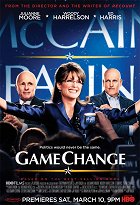Réalisation:
Jay RoachScénario:
Danny StrongPhotographie:
Jim DenaultMusique:
Theodore ShapiroActeurs·trices:
Ed Harris, Julianne Moore, Woody Harrelson, Sarah Paulson, Ron Livingston, Peter MacNicol, David Barry Gray, Tiffany Thornton, Jamey Sheridan (plus)Résumés(1)
This ambitious HBO production offers a behind-the-scenes look at the election campaign of John McCain, the 2008 Republican candidate for president. Trailing Barack Obama, McCain and his election staff decide to pin their hopes on the relatively unknown governor of Alaska, Sarah Palin. Although at first the self-confident and capable individual gives the campaign a needed lift, she gradually begins to drown in her own absurd pronouncements, which are soon being mocked around the world. The movie shows the inner workings of a political campaign and confirms certain views of the outlandish and controversial Sarah Palin. The then manager of the McCain election campaign has stated that Game Change represents a truthful depiction of the story as it played out at the time. The director’s emphasis on faithfully portraying the topic can be seen as well in the outstanding rendering of the Alaskan governor, performed on-screen to a T by the highly talented Julianne Moore. (Karlovy Vary International Film Festival)
(plus)Critiques (1)
I have a small problem with the adjective “political” as it is automatically applied to films that are clearly defined in ideological terms and which either condemn or celebrate a particular political view. In contrast to that, Game Change skilfully avoids taking an obvious political stance (even though it could be classified among the films of the post-Obama comedown) and transforms the 2008 election into a rise-to-stardom story of an orthodox woman from Alaska. The filmmakers likably go beyond just presenting Palin behind the scenes (i.e. as the victim of a game played by people more powerful than her) and show us that even a modest girl from the mountains, as the then-governor was, can have an impact on politics. This transformation, portrayed superbly by Julianne Moore, drives the narrative, whose dynamism is also aided by the budding conflict with one of McCain’s campaign advisors (Woody Harrelson). Like Clooney’s more sophisticated The Ides of March, Roach’s film does not engage in a specific ideology (rather fittingly for today’s post-ideological society), but with the mechanism of power itself, which is a shame, because by drawing from an actual historic basis and having its premiere broadcast in the year of the following presidential election, it could have prodded viewers in a certain direction. Only then would this drama have excelled not only due to its cast, but also due to a certain degree of provocativeness, which brings me back to the first sentence of this review, because I consider the ability to encourage civic engagement in the audience to be one of the essential attributes of a political film. But of course there are political films and “political” films. 75%
()

